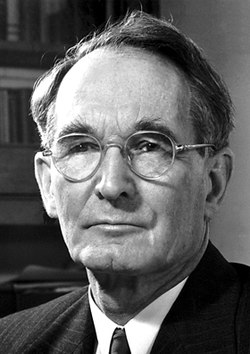
Back بيرسي ويليامز بريجمان Arabic بيرسى ويليامز بريجمان ARZ Persi Bricmen Azerbaijani پرسی ویلیام بریجمن AZB Персі Уільямс Брыджмен Byelorussian Пърси Уилямс Бриджман Bulgarian পার্সি উইলিয়াম্স ব্রিজম্যান Bengali/Bangla Percy Williams Bridgman BS Percy Williams Bridgman Catalan پێرسی ویلیامز بریجمان CKB
Percy Williams Bridgman | |
|---|---|
 Bridgman in 1946 | |
| Born | April 21, 1882 Cambridge, Massachusetts, U.S. |
| Died | August 20, 1961 (aged 79) Randolph, New Hampshire, U.S. |
| Alma mater | Harvard University (PhD) |
| Known for |
|
| Spouse |
Olive Ware (m. 1912) |
| Awards |
|
| Scientific career | |
| Fields | High-pressure physics |
| Institutions | Harvard University (from 1910) |
| Thesis | Mercury Resistance as a Pressure Gauge[2] (1908) |
| Doctoral advisor | Wallace Clement Sabine[2] |
| Doctoral students |
|
| Writing career | |
| Genre | Philosophy of science |
| Notable works | The Logic of Modern Physics (1927) |
Percy Williams Bridgman (April 21, 1882 – August 20, 1961) was an American physicist who received the Nobel Prize in Physics in 1946 for his work on the physics of high pressures. He also wrote extensively on the scientific method and on other aspects of the philosophy of science.[3][4][5] The Bridgman effect, the Bridgman–Stockbarger technique, and the high-pressure mineral bridgmanite are named after him.
- ^ Newitt, D. M. (1962). "Percy Williams Bridgman 1882–1961". Biographical Memoirs of Fellows of the Royal Society. 8: 26–40. doi:10.1098/rsbm.1962.0003.
- ^ a b c "Percy Bridgman". Mathematics Genealogy Project.
- ^ "Percy W. Bridgman". Physics Today. 14 (10): 78. 1961. doi:10.1063/1.3057180.
- ^ Bridgman, P. (1914). "A Complete Collection of Thermodynamic Formulas". Physical Review. 3 (4): 273–281. Bibcode:1914PhRv....3..273B. doi:10.1103/PhysRev.3.273.
- ^ Bridgman, P. W. (1956). "Probability, Logic, and ESP". Science. 123 (3184): 15–17. Bibcode:1956Sci...123...15B. doi:10.1126/science.123.3184.15. PMID 13281470.